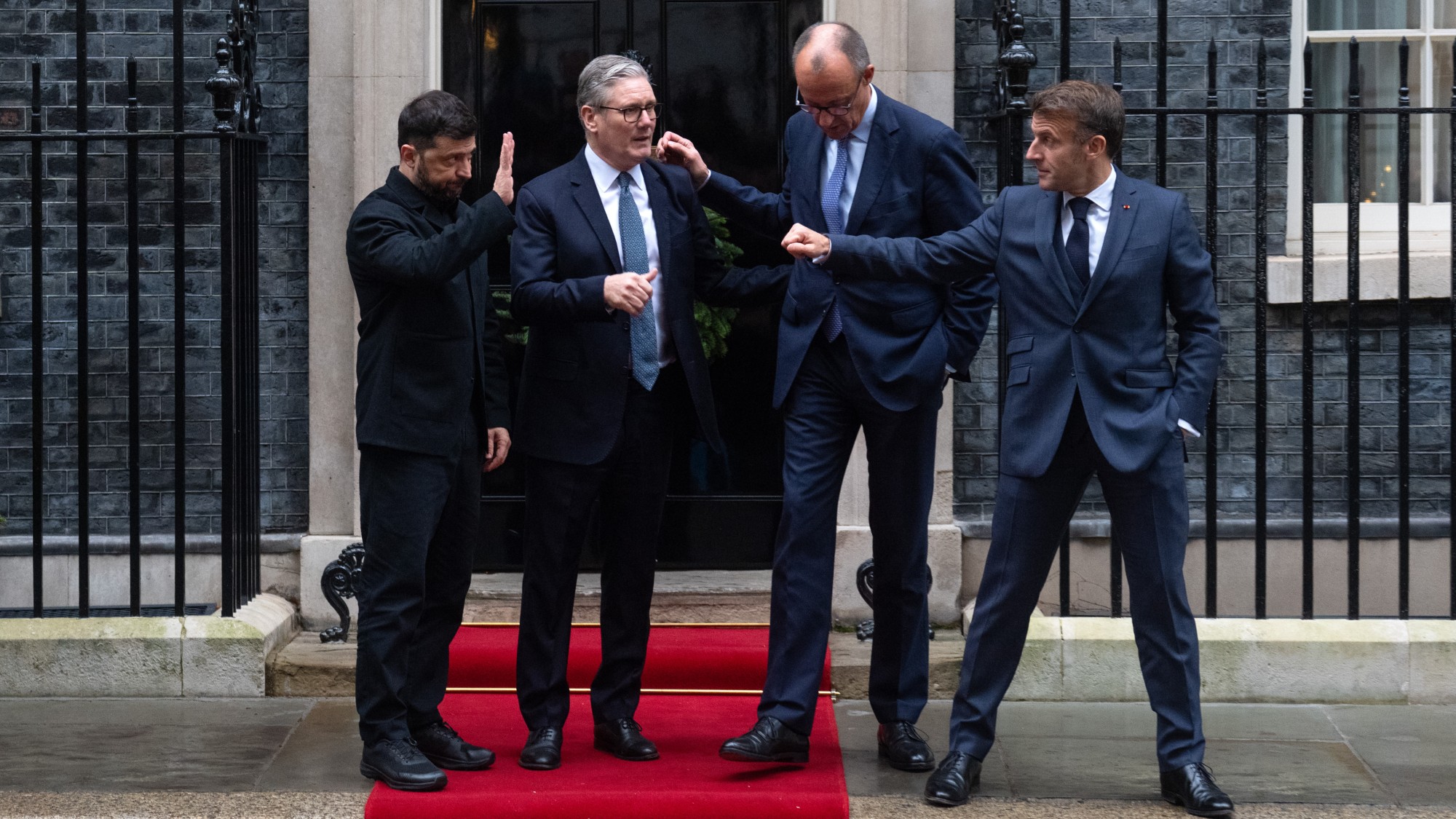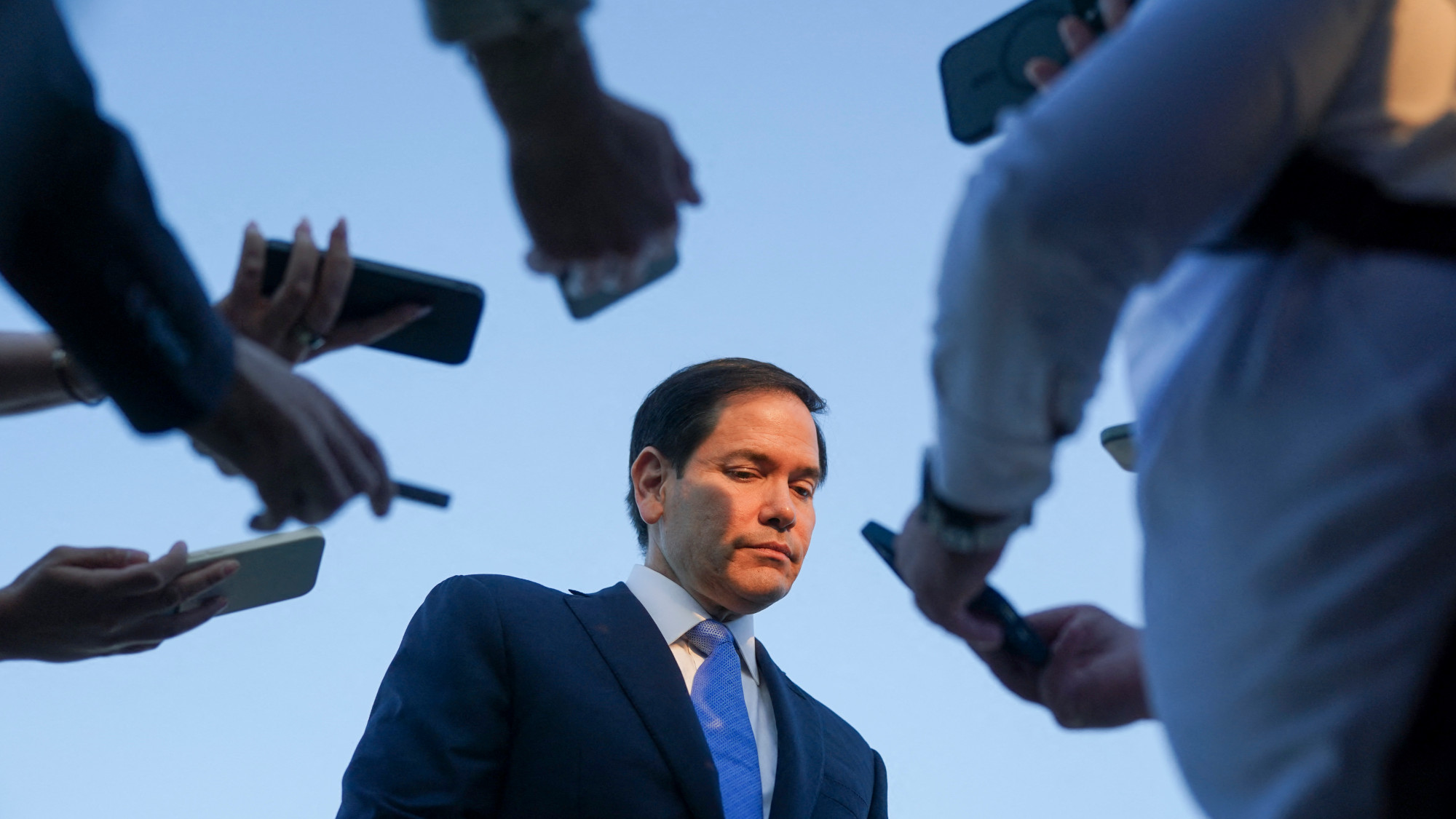The 1 thing Biden got exactly right
A successful balancing act on Ukraine


A free daily email with the biggest news stories of the day – and the best features from TheWeek.com
You are now subscribed
Your newsletter sign-up was successful
President Biden has been getting a lot of grief lately: Low approval ratings. A stalled agenda on Capitol Hill. An inflation-wracked economy. Dismal prospects for his party in the upcoming midterm elections.
But it's important to give credit where it's due. And the fact is that on the issue with the greatest and gravest potential consequences for the United States and the world — Russia's invasion of Ukraine — Biden and his team have come about as close to hitting the sweet spot as one could reasonably hope for.
This doesn't mean they've gotten everything exactly right. They certainly haven't achieved the goals of some imagined Plan A — avoiding the invasion in the first place, defeating Russian forces and expelling them from Ukraine, accomplishing regime change in Russia by deposing President Vladimir Putin. None of this, or really anything close to it, has happened. But Plan As are almost never in the cards. Ours is a Plan B world, and judged by that standard, the Biden administration has done very well indeed.
The Week
Escape your echo chamber. Get the facts behind the news, plus analysis from multiple perspectives.

Sign up for The Week's Free Newsletters
From our morning news briefing to a weekly Good News Newsletter, get the best of The Week delivered directly to your inbox.
From our morning news briefing to a weekly Good News Newsletter, get the best of The Week delivered directly to your inbox.
What is this Plan B? Arming (and sharing intelligence with) Ukraine so it can effectively defend itself against, and inflict significant pain on, the invaders. Imposing punishing sanctions on the Russian economy. Keeping NATO unified and encouraging its members to contribute more to defense. And all the while avoiding an escalatory spiral that could draw NATO directly into a war with Russia, a prospect that risks a nuclear conflagration.
Good governance and wise statesmanship don't always involve finding a prudent mean between extremes, but this is a case where that really is what Biden has achieved. On either side, analysts and officeholders criticize him — one camp for doing too much, the other for doing too little. While each has some cogent arguments on its side, Biden's position is stronger. And it's important to recognize why.
The first group of left- and right-wing critics — let's call them Restrainers — worry about risks of escalation and question whether Ukraine and its fate matters all that much to America's vital security interests.
I'll concede that if the geopolitical order were being rethought from scratch, there might be reason to wonder about the wisdom of the U.S. placing great weight on what happens in an economically peripheral country nearly 5,000 miles away in far Eastern Europe, right on Russia's border.
A free daily email with the biggest news stories of the day – and the best features from TheWeek.com
But of course we aren't in a position to rejigger the geopolitical order from scratch. In the world in which we find ourselves, we are deeply invested in Europe's security architecture and bound by treaty to defend members of NATO against attack. Given that baseline, a military invasion of Ukraine — the first of its kind and scope since the end of World War II, the conflict out of which our commitments to the continent originally arose — matters a great deal.
If the United States and its allies had responded to Russia's invasion with relative indifference, denying Ukraine the means to defend itself and leading to a quick and easy victory for Putin, the Russian dictator might reasonably conclude the West would respond with similar passivity to an incursion into a NATO state — mostly likely in the Baltics, to reestablish a land bridge between Russia and the discontiguous outpost of Kaliningrad Oblast, home of the Baltic Fleet of the Russian Navy.
That would either prove a catastrophic miscalculation on Putin's part — sparking a direct military conflagration between NATO and Russia — or demonstrate that NATO is a paper tiger based on a bluff, which would likely inspire even greater acts of Russian aggression against the countries of Eastern and Central Europe.
A strong, but limited, response to Putin's invasion of Ukraine to demonstrate NATO resolve, including a possible expansion of the alliance to Finland and Sweden, is a far better course of action — and exactly what the Biden administration has pursued.
The other camp of critics — let's call them the Escalators — thinks Biden and NATO have done far too little to defend Ukraine and punish Putin. He's committing war crimes. He's using threats of nuclear annihilation to bully the West and subjugate a nation. He's getting away with genocide. We can't let him. We have to do something.
Of course we are already doing quite a lot, but because it isn't leading to the kind of decisive outcome the critics believe morality and international law demand, they say we must do more. Even if it risks direct NATO participation in the war. Even if it means sending American troops to join the battle. Even if it greatly increases the risk of a nuclear exchange.
The situation is indeed morally grave — and moral considerations need to be a factor in how we respond to events on the ground. But in deciding between courses of action in international affairs, it's necessary to do more than weigh present policy against a change we imagine would halt bad events. That's because the other side also gets a say, which means that intervening more forcefully (widening the war) could well increase the sum total of human suffering.
Many Ukrainians have already died, and many more will continue to die as members of the Ukrainian military and civilians fight back against the Russian army. How would that change if NATO became more directly involved, sending troops to join the fight and maybe even bombing Russian cities (as one prominent public figure recently advocated in a since-deleted tweet)? The numbers would almost certainly increase, and perhaps by quite a lot, as the theater of battle widened and more deadly weapons were introduced.
And that's without contemplating worst-case scenarios, like Ukraine ending up as a nuclear wasteland. That can hardly be what these critics have in mind when they demand more dramatic forms of intervention. But it could well end up being the result.
If the primary goal of U.S. policy is saving Ukrainian lives, we should be urging negotiation or surrender to stop the fighting. But that doesn't seem to be what the Ukrainian people want, and it wouldn't necessarily advance American interests around the globe. Given that balance of considerations, the best course of action is doing what we can to aid Ukraine in its fight while trying to avoid an escalation that could make the situation far worse.
It's possible to quibble with this or that decision of the Biden administration (or statements of the commander-in-chief himself), but overall the president and his team have done an impressive job of ending up with the right mix of force and restraint.
The situation could change in all kinds of ways over the coming days, weeks, and months. But for now Biden deserves high marks for how he's handled the most momentous geopolitical crisis in decades.
Damon Linker is a senior correspondent at TheWeek.com. He is also a former contributing editor at The New Republic and the author of The Theocons and The Religious Test.
-
 Political cartoons for February 17
Political cartoons for February 17Cartoons Tuesday’s political cartoons include a refreshing spritz of Pam, winter events, and more
-
 Alexei Navalny and Russia’s history of poisonings
Alexei Navalny and Russia’s history of poisoningsThe Explainer ‘Precise’ and ‘deniable’, the Kremlin’s use of poison to silence critics has become a ’geopolitical signature flourish’
-
 Are Hollywood ‘showmances’ losing their shine?
Are Hollywood ‘showmances’ losing their shine?In The Spotlight Teasing real-life romance between movie leads is an old Tinseltown publicity trick but modern audiences may have had enough
-
 The ‘mad king’: has Trump finally lost it?
The ‘mad king’: has Trump finally lost it?Talking Point Rambling speeches, wind turbine obsession, and an ‘unhinged’ letter to Norway’s prime minister have caused concern whether the rest of his term is ‘sustainable’
-
 The billionaires’ wealth tax: a catastrophe for California?
The billionaires’ wealth tax: a catastrophe for California?Talking Point Peter Thiel and Larry Page preparing to change state residency
-
 Trump considers giving Ukraine a security guarantee
Trump considers giving Ukraine a security guaranteeTalking Points Zelenskyy says it is a requirement for peace. Will Putin go along?
-
 Vance’s ‘next move will reveal whether the conservative movement can move past Trump’
Vance’s ‘next move will reveal whether the conservative movement can move past Trump’Instant Opinion Opinion, comment and editorials of the day
-
 Bari Weiss’ ‘60 Minutes’ scandal is about more than one report
Bari Weiss’ ‘60 Minutes’ scandal is about more than one reportIN THE SPOTLIGHT By blocking an approved segment on a controversial prison holding US deportees in El Salvador, the editor-in-chief of CBS News has become the main story
-
 Will there be peace before Christmas in Ukraine?
Will there be peace before Christmas in Ukraine?Today's Big Question Discussions over the weekend could see a unified set of proposals from EU, UK and US to present to Moscow
-
 Ukraine and Rubio rewrite Russia’s peace plan
Ukraine and Rubio rewrite Russia’s peace planFeature The only explanation for this confusing series of events is that ‘rival factions’ within the White House fought over the peace plan ‘and made a mess of it’
-
 Memo signals Trump review of 233k refugees
Memo signals Trump review of 233k refugeesSpeed Read The memo also ordered all green card applications for the refugees to be halted
